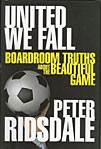 Boardroom Truths About The Beautiful Game
Boardroom Truths About The Beautiful Game
by Peter Ridsdale
Macmillan, £18.99
Reviewed by Duncan Young
From WSC 251 January 2008
On the face of it, Peter Ridsdale’s account of his life at Leeds – and especially the events that led to him leaving the club – is a hard sell. It’s light on sensational revelations, supporters at his current club, Cardiff City, will have little interest and Leeds fans in general regard him with views ranging between disappointment and fury.
With all proceeds going to charity, it’s clear that the motivation for Leeds’ erstwhile chairman is singularly personal. He wants his account of the club’s travails on record alongside that of David O’Leary and he can’t resist one last attempt at persuading his former customers and fellow Leeds fanatics that he doesn’t deserve to be their isolated scapegoat.
The book opens with Ridsdale’s journey from schoolboy fan to successful businessman, then details how he was drawn into the running of his chosen club. The central section offers an overview of the main incidents in his tenure before he reflects on decisions made there since he left. His narrative unfolds fluently, but there’s very little here to add to what was known already. The stand-out disclosure is Martin O’Neill’s ill-fated 2003 pre-contract agreement to take over as manager, but the most compelling passage is without doubt the story of Ridsdale’s widely praised role in the tragic events surrounding Leeds’s UEFA Cup tie in Istanbul seven years ago.
Elsewhere, his articulate plea for mitigation struggles to escape the shackles of his own blunt conclusions: “As chairman, I accept that I’d allowed expenditure to get out of hand, allowing it to run away with our dreams. At times I was breathtakingly naive and didn’t stand up enough to David O’Leary… We didn’t have a contingency plan for the team falling out of the top five.” He peppers his story with knowing asides – such as “Tracksuits never belong in a room full of suits when business decisions need to be made” and “Who in their right mind authorises a commission that represents 40 per cent of a transfer deal?” – but regularly emphasises his own affinity with the terraces and the dressing room at the expense of boardroom niceties. He also admits throughout to serial naivety.
Ridsdale’s humble tone is appropriate, if eventually grating, but it is with some relief that we see him finally displaying some savvy over the retrospectively vital negotiations concerning Rio Ferdinand’s transfer to Manchester United. Watching his board overrule him on appointing Steve McClaren as O’Leary’s successor, insisting instead on Terry Venables, provides some welcome amusement in these post-Croatia days.
Ridsdale’s earnest entreaty, though, omits one crucial remark from his 2003 press conference as Janathan Woodgate departed for Newcastle: “If it’s the choice of losing 10,000 season-ticket holders or selling Woodgate for £9million, there’s not even a discussion.” That barb was probably thoughtless rather than premeditated, but at less than five years’ distance it could all be a bit too soon for the supporters of his one genuine football love to forgive and forget.
That last comment sounds like something I would say